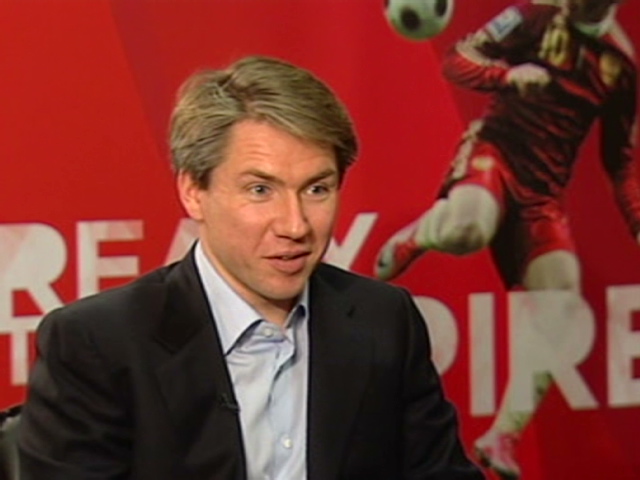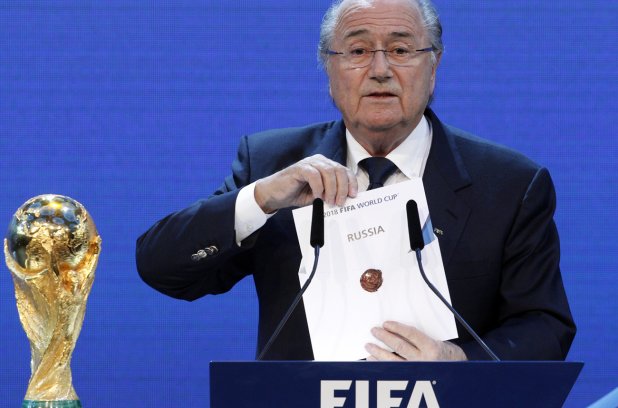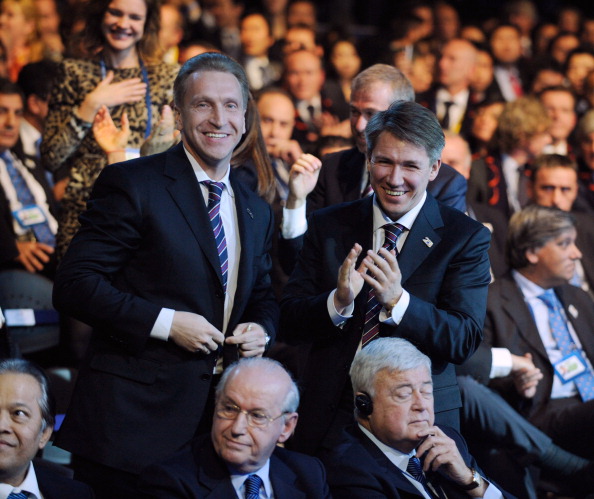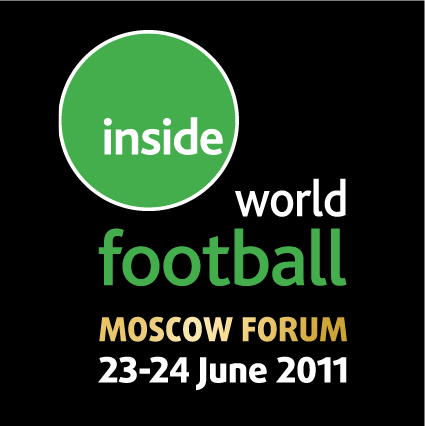By Mihir Bose
 June 7 – The last few weeks have hardly been an advertisement for world football with corruption scandals engulfing FIFA but, for Alexey Sorokin, chief executive of the Russian 2018 organising committee, none of this will dim the glory of the World Cup.
June 7 – The last few weeks have hardly been an advertisement for world football with corruption scandals engulfing FIFA but, for Alexey Sorokin, chief executive of the Russian 2018 organising committee, none of this will dim the glory of the World Cup.
“No, no”, he tells me, “all the controversies in the world cannot take the glitter away from the World Cup.
“The event is of such magnitude that, no matter what happens around it, it’s still going to be a great event.
“I hope the FIFA Congress will put an end to allegations, to all the fuss around it and finally everybody gets to work.”
The recent FIFA crisis saw Vladimir Putin, the Russian Prime Minister, in contrast to some other world politicians, come out strongly in support of FIFA President Sepp Blatter.
For Sorokin there are no problems working with FIFA: “What is the problem?
“At the Congress, there was a good intervention by the President [Costakis Koutsokoumnis] of the Cyprus Federation who said that ‘allegation’ is a very good English word.
“Yes, one stands up, says something, steps aside, and then suddenly there’s a lot of people who have to explain something and yes, it gets a life of its own.
“FIFA has always been a good partner; this partnership will grow only stronger during the next seven years.
“We’ll prepare all the documents that are required by appropriate agreements with FIFA and prove that we are working hard for the success of the World Cup.”

But is FIFA not a difficult partner, as the South Africans found out during last year’s World Cup?
Not only were there very strict conditions about how the competition had to be run but Mandela’s rainbow nation even had to change some of its laws.
“Well,” says Sorokin, “the good thing about it is that you know the requirements during the bid stage.
“If you’re not happy with them, you just don’t bid.
“It makes no sense, and is highly improper, to first sign all the documents, agree not only on the principles of bidding but the principles of organising the game, and then start to complain about them.
“We have no concerns about working with FIFA.”
So well does he see the partnership with FIFA working that the world body will have an important input in the message Russia develops for 2018: “Every country that has organised the World Cup has a different message.
“Ours is currently taking shape.
“That is one of the tasks of this year, to define the ideology, the vision of the World Cup.
“There could be more than one message, many messages, and we are thinking about it constantly.
“We intend to do that under FIFA’s guidance.”
With 2018 following on from a World Cup in Brazil (every football neutral’s favourite country), the Russians know it will be a challenge to come up with the right message.
They will be watching Brazil closely.
“Well it will be interesting to see.
There will be a lot to learn, which we will do, of course,” Sorokin added.
He acknowledges that in future, bidders for the World Cup will also have a lot of learning to do.
This is because the FIFA Congress, not the executive, will decide who hosts World Cups.
He said: “Since there are more parties involved in the voting, it means more work, more lobbying, more presentations, more travel for future candidates.”
Was he glad that Russia was bidding only to the 22-man Executive not to 208 member associations?
“We would have done just as well with the entire 208, I’m sure,” he commented.
“We had a strong case and we clearly defined our goal.”
But when I suggest that the entire Congress making decisions on future World Cups could provide more scope for corruption, he quickly says, “I don’t think so, no.”
Just the sort of answer you would expect from the 39-year-old graduate of the Moscow State Linguistic University, who cut his teeth in Russia’s diplomatic service and served in the Russian Embassy in Washington.
After that he became what has been seen as an unusual Russian sports official.
His sports jobs have involved organising the Champions League Final between Manchester United and Chelsea in Moscow in 2008, being general secretary of the Russian Football Federation before taking charge of the World Cup, first the bid process, now the organisation.
This experience of sports has made him aware of what makes a successful bid: “A bid needs to appropriately evaluate resources and chances and, once a decision has been made, not be stopped by perceptions, by allegations or anything else, just move ahead towards the goal.”
He also readily confesses that there was a fatal flaw in Moscow’s abysmal bid for 2012 Olympics.
Moscow went head to head with London, Paris, Madrid and New York and was eliminated in the first round with only 15 votes.
“Moscow made a mistake,” he said.
The Government support for 2012 was not that articulate, it was not that strong, not the scope of support needed.”
Since then, of course, Russia appears to have found the secret of winning bids: Sochi surprising the world by winning the 2014 Winter Games before Russia beat Spain, Holland-Belgium and England for the 2018 World Cup.

Sorokin smiles when I ask him what the Russian secret is, “It has to remain a secret to be called secret.
“No, the secret is very simple, it’s a lot of work, it’s Government support.
“Without the Government, without the support of your country, you cannot have a successful bid.”
Then he adds a point that the English FA would do well to take on board: “It is important to have a well established place in the organisation that you’re bidding at and, I guess, a bit of luck always helps.”
A Russian victory for 2018 seemed to have been previewed by FIFA president Sepp Blatter in an interview for insideworldfootball last April.
Blatter told me that the World Cup needed to go to new countries.
But when I refer to this, Sorokin brushes aside the idea that the Russian victory was a formality: “No, every victory is a surprise, a good surprise.
“I mean we were confident but not complacent.
“Anything could happen.
“Nobody knew before the word Russia appeared from the envelope that we were going to win.”
He also has no doubts about what staging the World Cup means: “It means a lot for Russia, not only an opportunity to organise the world’s greatest event, it’s an opportunity to improve our country, improve our infrastructure, not only sporting infrastructure, but the general one.
“It gives us an opportunity to improve the perception of Russia abroad.”
For instance, I ask, the negative perception of problems with racism in Russian football?
“We have some issues, we acknowledge that,” says Sorokin, who will be speaking at this month’s this month’s Inside World Football Moscow Forum.
“That gives us an opportunity to work on them.
“We do not claim that we have a perfect system, but who does?
“We’ll gradually overcome these issues, I’m absolutely sure.”

However, he refuses to accept that Russia is seen negatively in the world.
“This doesn’t count as a negative perception of Russia,” he comments.
“Russia has a lot of friends, a lot of people, intelligent people, know about the transition that our country has been going through and that we’re on the right track.”
This is a reference to the enormous change that followed the collapse of the Soviet Union.
Sorokin acknowledges that it had a dramatic impact on Soviet sport and its influence across the world: “The reasons are absolutely natural.
“You have 15 republics all in one country, and then suddenly you have 15 independent states.
“Your population is suddenly minus 90 million and quite naturally you have exactly 40 percent less athletes.
“If we talk football, there were talented players coming from Ukraine, Georgia, from Kiev, from Minsk.
“Suddenly they had become independent countries wanting to establish their own national teams. “Of course, there were less talented coaches, less talented athletes, the country became less wealthy.
“When you have a disintegration of this magnitude the transition period is always very, very difficult.
“But I think we’ve recovered successfully from that.
“You need to resolve vital issues first and then comes sport.
“Once we got past them, we started to be successful in sport and culture and everything else.
“Sport is a reflection of the way of life in every country.”
The Russians intend to spend a lot of money to show off their way of life during 2018 and Sorokin says, “At the press conference dedicated to our victory, our Prime Minister Putin disclosed that the figure would be $10 billion (£6 billion).
“He expects a large contribution within that figure, of course, from rich private individuals.
“We will build what we need to build.
“That doesn’t only mean sporting venues, that means everything that we deem necessary to build for the comfort of both Russians and visitors.
“The World Cup will be an opportunity to show the world not only our hospitality, but the progress we have made over recent years.
“It’s going to be proof of the stability of both the economic and political systems in Russia, the wealth, forgive me, that we have acquired over time and of the comfort that we can provide to visitors.”
Sorokin is confident that a lot of people from abroad will travel to Russia for the World Cup.
“We’re sure that it’s going to be in excess of a million from outside.
“During the bid phase, we always said that we are very well placed for people travelling from Asia, from the Middle East, from Europe.
“Latin America and North America are a bit further, but still very convenient.”
Sorokin explains that the fans will be able to travel to the far flung regions of Russia by train to watch matches: “We hope to develop the trains before the World Cup.
“We have already launched a number of railroad lines, with St Petersburg-Moscow, Moscow-Nizhny Novgorod and St Petersburg-Helsinki now operational, so it’s developing gradually.
“It’s not that we will suddenly launch lines in every direction in 2017.
“You cannot have a successful World Cup, or Olympic Games, without developing a certain region.”
So what does this ex-diplomat, happily married with a young daughter, bring to this job?
“The job is so all-embracing that I’ll have to bring everything I have to this job,” he says.
And he insists he has a lot of freedom to make his own initiatives: “There is always room for good initiative.
“It’s not just about organising a competition or a match.
“There is more to it and it has to be special.”
For more details on the Inside World Football Moscow Forum, please click here.
Related stories
June 2011: IMG executive says Russia in a better position than South Africa to take advantage of hosting
June 2011: Russia’s 2018 stadia should be flexible, says Wembley director
June 2011: We want Russia 2018 stadia to capture feel of the country, says Populous principal
June 2011: Galal urges Russia 2018 to get public-private investment balance right
May 2011: Coward confirmed as latest speaker at Inside World Football Moscow Forum

